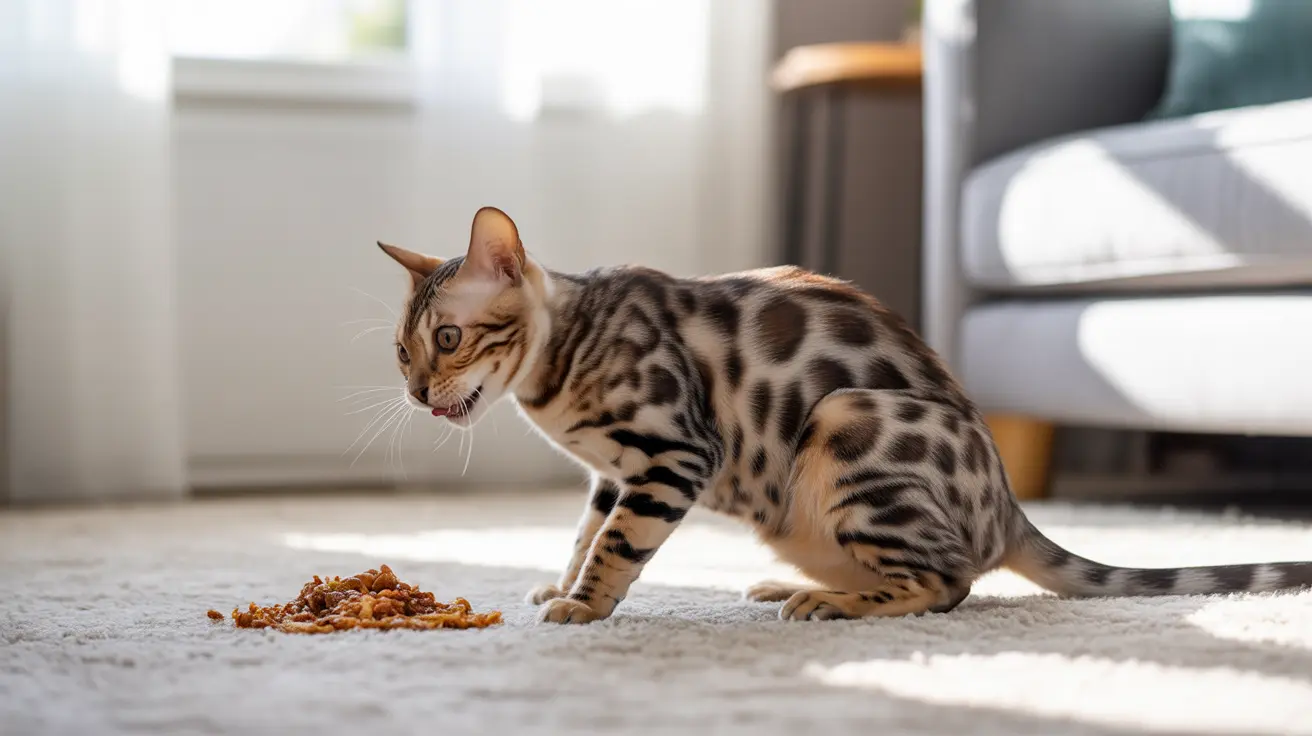When your cat starts vomiting, it can be both concerning and frustrating for pet owners. While occasional vomiting might be normal, understanding the underlying causes and knowing when to seek veterinary care is crucial for your feline friend's health and wellbeing.
In this comprehensive guide, we'll explore the various reasons behind cat vomiting, how to identify different types of vomiting, and most importantly, when you should be concerned about your cat's symptoms.
Why Is My Cat Throwing Up? Common Causes and Triggers
Cats may vomit for various reasons, ranging from minor issues to serious medical conditions. Understanding these causes can help you better address your pet's needs:
- Dietary issues (eating too fast, food allergies, or sudden diet changes)
- Hairballs from grooming
- Foreign object ingestion
- Gastrointestinal infections or parasites
- Inflammatory bowel disease
- Systemic illnesses (kidney disease, hyperthyroidism, etc.)
My Cat Keeps Throwing Up But Seems Fine
Sometimes cats may vomit occasionally while maintaining normal behavior and appetite. This situation, while concerning, might not always indicate a serious problem. However, even if your cat seems fine, frequent vomiting should be monitored and discussed with your veterinarian, especially if it occurs more than once per week.
Cat Throwing Up Food: Understanding the Patterns
When your cat is throwing up food, the timing and appearance of the vomit can provide important clues about the underlying cause:
- Immediate post-meal vomiting might indicate eating too quickly
- Undigested food could suggest regurgitation rather than true vomiting
- Partially digested food might point to digestive issues
- The presence of bile or foam can indicate an empty stomach
Cat Vomiting White Foam: What It Means
If your cat is vomiting white foam, this could indicate several conditions:
- Empty stomach acid buildup
- Hairballs
- Gastritis
- Inflammatory bowel disease
- Upper respiratory infections
When Does Cat Vomiting Require Veterinary Attention?
While occasional vomiting might not be cause for alarm, certain symptoms warrant immediate veterinary care:
- Blood in vomit
- Projectile vomiting
- Lethargy or depression
- Concurrent diarrhea
- Loss of appetite
- Frequent vomiting (more than once per day)
- Signs of pain or distress
Frequently Asked Questions
Why does my cat keep throwing up after eating?
Cats may vomit after eating due to eating too quickly, food allergies, or underlying digestive issues. Try feeding smaller portions, using slow-feed bowls, or elevating the food bowl to help prevent post-meal vomiting.
How can I prevent hairballs from causing vomiting in cats?
Regular grooming, specialized hairball-control diets, and dietary supplements can help reduce hairball formation. Brush your cat regularly and consider using hairball prevention products recommended by your veterinarian.
What are the signs that my cat's vomiting is a serious health issue?
Watch for lethargy, blood in vomit, weight loss, excessive thirst, frequent vomiting, or changes in behavior. These symptoms may indicate a serious condition requiring immediate veterinary attention.
Can I treat my cat's vomiting at home, or when should I see a vet?
For occasional vomiting in an otherwise healthy cat, withhold food for 12 hours (but provide water), then introduce small amounts of bland food. See a vet if vomiting persists, occurs frequently, or is accompanied by other concerning symptoms.
How can I help my cat feel better if they are vomiting frequently?
Ensure fresh water is always available, feed small, frequent meals of easily digestible food, and maintain a calm environment. However, frequent vomiting should be evaluated by a veterinarian to determine the underlying cause and appropriate treatment.
Remember, while occasional vomiting might be normal for cats, persistent or severe vomiting requires professional medical attention. Always consult with your veterinarian when in doubt about your cat's health symptoms.






